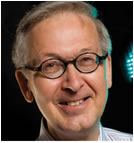God and miracles

Shut your eyes, imagine God and when you open your eyes again, pick the description of God that best fits your view:
— A fuzzy feeling I get inside
— A powerful being who can produce lightning bolts
— A man with a beard on a fluffy cloud
— A higher force
OK, if your idea wasn’t on the list, that’s fine too!!
What would a scientist say?
What about scientists who have a religious view – how do they imagine God? Dr Denis Alexander is a biologist and a Christian. Professor Sir Colin Humphreys is also a Christian. Here are their images of God.
In this analogy by Professor Humphreys, God is a composer.
 Imagine you are standing behind a pianist who is playing without music and you are watching the pianist’s fingers.
Imagine you are standing behind a pianist who is playing without music and you are watching the pianist’s fingers.
 Every time the pianist goes to play the note “F” he plays “F sharp”. You can deduce from this the key signature of the music. The key signature is the rule the composer establishes for playing that piece of music.
Every time the pianist goes to play the note “F” he plays “F sharp”. You can deduce from this the key signature of the music. The key signature is the rule the composer establishes for playing that piece of music.
If you keep watching you may observe that, on occasion, when the pianist should play “F sharp” he plays “F”, or he may play black notes when you expect him to play white ones.
These are what musicians call “accidentals” which the composer has deliberately put in the music. The composer, of course, is free to put accidentals in the music – he is the composer – and although he’s set up a key signature which signifies the way the music should normally be played, he is free to say that it should be played differently on occasions.
If he is a great composer, the accidentals will never be used capriciously, they will always make better music. It is the accidentals which contribute to making the piece of music great.
So to return to the main question of this article, “Can Scientists Believe in Miracles?” I suggest that some miracles, the Resurrection for example, are like accidentals on a music score, in which the Great Composer is overriding the normal way the universe operates.
The analogy with how God operates is clear. God created and upholds the universe but, like the great composer, he is free to override his own rules. However, if he is a consistent God, it must make more sense than less for him to override his rules.
I believe it is rare for God to locally override physical laws and perform a miracle like this. I believe most miracles are miracles of timing in which no scientific laws are overridden.
Read more in this article by Prof Colin Humphreys
Can a Scientist believe in Miracles? [Word doc]
 The Abrahamic faiths, Judaism, Christianity and Islam, all believe that God is the source of everything that exists.
The Abrahamic faiths, Judaism, Christianity and Islam, all believe that God is the source of everything that exists.
So the relationship between God and creation is something like the relationship between an author and their book.
In this picture it is of course God who is the author and the universe which is the book. In theological language we say that God is the Primary Cause (the Author), and then all the materials and energy that God uses to write the book of the universe are known as Secondary Causes. These are equivalent to all the narratives inside a book.
If you are doing English Literature, then one of your areas of study is to analyse texts and work out their meaning.
In the same way it is the task of scientists to study the ‘texts’ of God’s universe and find out how they’re written.
 It turns out that God’s key texts are written in the language of mathematics.
It turns out that God’s key texts are written in the language of mathematics.
The early astronomers Kepler and Galileo both pictured God as the great Mathematician. Today we can write elegant equations to describe the physical properties of the universe.
The task of science, then, is to find out how God has written the book of creation and how he continues to sustain all that exists. To press the analogy a bit further, this is a book that is still being written.
Every analogy has its limitations and one problem with the author analogy is that it can make it look as if God is the great determinist, the divine puppet-master, controlling everything that happens, as a human author would in his or her novel.
But of course that’s not what Christians believe about God. They believe that God has given us free-will so that we can make genuine moral choices.
Read more in this article by Dr Denis Alexander.
What is God like? [Word doc]
Next: Is your view here?